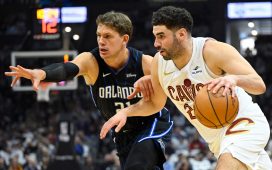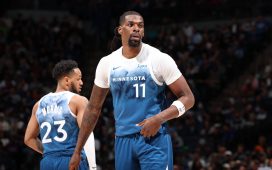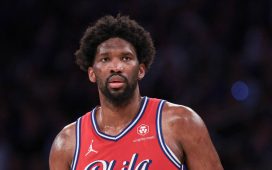SAN FRANCISCO — Because Luka Dončić is ahead of schedule, so are the Mavericks. They drafted their generational superstar just four years ago and, within months of his rookie season, jettisoned all four starters to build around him.
They abandoned their first attempt at finding a running mate, Kristaps Porziņģis, at this year’s trade deadline. When that triggered what it did — the league’s second-best record following the All-Star game and this run to the Western Conference finals — the Mavericks decision makers said they expected the trade to improve them.
And, hey, it did. But perhaps not enough, not yet, not against the championship-proven Golden State Warriors, who have served as this conference’s hegemon and aren’t relinquishing that eminence so simply.
Friday’s 126-117 defeat in Game 2 was a harsh reminder the Mavericks’ roster construction isn’t complete. The Warriors’ methodical erasure of Dallas’ 19-point lead felt similar to the horror-movie villain re-emerging after he’s thought to be vanquished. Those plots aren’t written with the classic hero’s journey, and those protagonists don’t usually receive happy endings.
To win titles in this league, it’s best to be the antagonist: bulletproof to the point of invulnerability, without weakness or fragility. Dallas wasn’t that on Friday, and now this team finds itself down 2-0 for the second straight series.
After being blown out in Game 1, it was clear the Mavericks couldn’t make this series competitive without hitting open 3s. With small, impactful adjustments — which we’ll get to — they created open shots and, this time, knocked them down. Dončić, still dealing with lingering shoulder pain, also entered Friday recovering from illness. “Last night, I was a little bit sick,” he admitted afterward. But there’s a reason Dallas has twice dismantled its team to build around him; his 42 points on 12-of-23 shooting, with eight assists to two turnovers, demonstrated that. Dallas roared ahead 26-10 in the game’s first minutes. It was there the reminders about this roster’s progress started.
This deep into the postseason, Jason Kidd really only trusts six players, not enough even for his shortened playoff rotations. Frank Ntilikina’s spell lasted four minutes as he missed all three of his jumpers. In the second half, Kidd reached further down the bench for Josh Green, who missed his only shot, an open corner 3, in the five minutes he played. Spencer Dinwiddie, even being one of those trusted six, didn’t show why in the 22 minutes he received. His play has been mercurial all postseason, but his four points Friday equaled the number of turnovers he committed. Golden State outscored Dallas by 11 during Ntilikina’s and Green’s stints, which is hard to recover from in a nine-point game.
After another offseason and trade deadline, Dallas might have another two-way wing who can fill that gap or, perhaps, Tim Hardaway Jr. healthy again. But this series isn’t being played in the future, but right now.
Kidd said his team lost this game defensively and that it doesn’t play well on that end when shots aren’t falling. Dončić agreed: “Offensively, we were fine. It’s just the defensive end we’ve got to improve a lot.” Still, it’s hard not to notice when Golden State’s playmaker off the bench, Jordan Poole, scores 23 points on 7-of-10 shooting. Or when Andrew Wiggins dribbles past closing defenders to find teammates under the rim. Or when the teammate most often open underneath, Kevon Looney, makes dynamic passes away from the rim and ends up with two points anyway. (His 21 points were a career high.)
These are Golden State’s direct counterparts to Dallas’ bench. The Warriors even survived their own depth issues — Damion Lee played an atrocious five-minute stretch — by plugging Moses Moody into the rotation in the second half; Moody contributed with a layup and an assist.
Dallas’ starters finished with 104 points to Golden State’s 90. That’s a simplistic reading of Friday’s result, one which isn’t nuanced or descriptive enough about the game’s ebbs and adjustments. The Mavericks aren’t incorrect to blame their defense for their defeat, but this game could have been won in a shootout, one where the second half had just enough shot making to carry the first half’s explosion. Against the Warriors, on the road, wins must be coerced however they can.
Dončić has made his ascension look easy, which, in turn, has made it difficult for the Mavericks’ team-building approach to keep up with him. It’s not his fault, not completely the team’s, certainly not this reformed front office’s, which only took charge last summer. And though this trip to the conference finals may have been ahead of Dallas’ schedule, there’s no sympathy being extended for overachieving. You want to be the West’s best team? This series, two games in, has exposed exactly the reasons why the Mavericks are not.
Both teams have wanted to avoid this series devolving into repeated one-on-one attacks against their star players. It’s understandable: Stephen Curry has grown into a great team defender over the course of his career, and Dončić made similar strides this regular season, but it’s a wasteful use of their finite energy levels to have them constantly defending 25 feet from the basket. Though Dallas has preferred to have Dončić trap aggressively when Curry pulls him into screening actions, Golden State has opted for Curry to show quicker and recover to his man. He’s only supposed to delay and muck up Dončić’s attacks, not force the ball from his hands. Wiggins, who has primarily matched Dončić, should have time to recover by then.
To start Game 2, Dallas threw out most of its stack pick-and-roll sets — ones where two players set screens for the ballhandler — and spammed the Dončić pick-and-roll with Reggie Bullock, Curry’s assignment. He set 29 screens on Friday, the most in any game this season; the second-most was the 22 he set in Game 1. (Four of the eight games he set the most screens came against Utah; another came in the regular season against Golden State.) Thanks to his quick release, Bullock is the ideal player to quickly relocate and bomb away before Curry can recover. These actions either sprung him for 3s, allowed Dončić to attack Wiggins before he reset or forced Golden State to help to Bullock, creating scramble situations Dallas duly exploited. Dallas averaged 1.7 points per possession every time Bullock screened for Dončić, an astronomically high number for any half-court action. It was a smart adjustment to the defensive strategy Golden State effectively had established in this series’ opening game.
Golden State reacted in the third quarter by moving Curry onto Dorian Finney-Smith, a slower-releasing shooter who doesn’t cause such panic when relocating from the ball. It’s probably why Dončić went from attacking Wiggins to seeking out Looney switches. Without Bullock’s disruptive gravity, Wiggins re-established proper defensive positioning against Dončić more often. Dallas also suffered from shooting reversion in the third, hitting just 2 of 13 from behind the arc.
Dončić, with all his ailments, admitted after the game that he’d entered halftime exhausted. Though trapping Curry on the other end prevented Dončić from being constantly exposed, Wiggins sometimes drove right at Dončić himself, breaking off primary actions to call his own number. While Wiggins shot 3-for-6 with Dončić as his closest defender — not nearly enough volume to sustain an offense — it’s useful to make Dončić expend energy in multiple ways.
Defensively, the Warriors sometimes let Dallas players cut straight down the lane, blanketing them on either side, using zone principles and trusting it’s almost impossible to laser passes down the floor’s middle for layups. Here’s one example below, late in the third quarter, although you can find half a dozen more if you comb through the footage. Dončić’s a brilliant enough passer that he might trust himself lobbing this over the top, but Otto Porter Jr.’s well positioned to disrupt anything but a perfect pass. The below screenshot ends in a kick ball violation, which Golden State surely counts as a defensive win.
On the other end, Dallas fell victim to Curry’s and Klay Thompson’s shooting gravity far too often. It’s hard not to react to them on the perimeter, knowing any sliver of space could result in the basketball swishing the net, but it’s how Looney often seemed to reside right at the rim for dunks. “We play defense when we play offense,” Kidd said afterward, “and we play no defense when we can’t score.” Like I said, I’m sure Kidd meant that as a critical assessment of his players. He’s asking them to be sharper no matter how well they’re playing on the other end.
But you could also read that pragmatically: If the Mavericks’ defense suffers when the ball isn’t going in, then they better make sure slumps like the third quarter don’t happen again. If Dallas has any chance to win games this series, it might be the shootout approach. Game 2 was a painful missed opportunity to steal one in that exact manner.
When the Mavericks went down 2-0 last series against the Phoenix Suns, they looked no more likely to win four of the next five games than they do now. It’s the inkling of hope this team should still feel about this series. But the Warriors are not the Suns, and what worked to eliminate Phoenix last round isn’t replicable. Dallas erased Chris Paul’s impact that series and then denied Devin Booker from getting to his favorite spots. It dared role players like Jae Crowder and Mikal Bridges to make plays dribbling and passing while restricting catch-and-shoot 3s.
Golden State has already proven its supporting cast can do exactly that, and Curry’s brilliance stems from not having favorite spots. He’ll shoot anywhere he’s given space. The Mavericks recognized how they could make their past opponents static; the roster-wide dynamism of the Warriors thus far has caused their defensive unraveling.
Dallas’ approach still could have won this game. It wasn’t dissimilar to Wednesday’s blowout defeat, but making open 3s and relying on Dončić’s brilliance naturally made it more effective. But even then, those improvements only were guaranteed to make this series competitive. Who won still came down to the minutiae and the smaller competitive margins.
Dallas lost Game 2 thanks to those things. And down 2-0, it’s difficult to see another path against a tougher opponent leading to four more wins.
(Photo of









